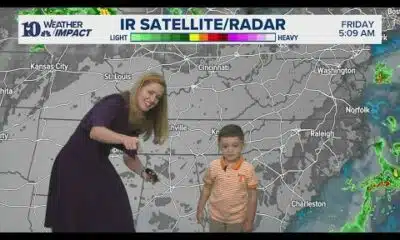News from the South - North Carolina News Feed
Griffin case heads back to trial court where it all started
‘Democracy being defended.’ Griffin case comes full circle while entering a new chapter
RALEIGH — Over 100 people stood in a line wrapped around the 10th floor of the Wake County Courthouse on Friday — an hour before Jefferson Griffin made his latest attempt to remove over 60,000 voters from the count in the Republican’s continual bid for a seat on the state’s highest court.
Some held bright green slips of paper declaring, “My vote matters.” Others debated how the N.C. Supreme Court may rule on the case, where it is expected to eventually return. Very few made it into the packed courtroom, whose maximum capacity was fewer than 60 people.
The court hearing marked the latest chapter in what seems to be an endless saga. And as Griffin pushes for a decision that’s in his favor, others are pushing back.
Outside, protesters stood on the courthouse steps for about an hour, holding signs, chanting “Every vote counts” and taking turns adressing the crowd.
Lily Levin was on a Fulbright scholarship in Chile when she voted overseas, and said she wasn’t surprised to find that her ballot was being challenged by Griffin.
“I think it’s the cynicism of growing up in a state that has been so extremely gerrymandered,” Levin explained. “My vote might be disenfranchised right now, that’s what we’re fighting for, but so many other people’s votes have been disenfranchised for so long.”
How we got here
After losing to Democratic Supreme Court Justice Allison Riggs by 732 votes, Griffin filed a series of election protests to remove three categories of voters from the count.
The first implicates 5,509 military and overseas voters who did not attach any photo identification to their ballot. The State Board of Elections contends that North Carolina law does not include these people in the recently implemented voter ID law. Griffin argues that the election board incorrectly interpreted the legislature’s intent when allowing these voters to cast ballots without photo ID.
The second protest challenges 267 overseas voters who have never resided in North Carolina but are permitted to vote in the jurisdiction their parents were last eligible under state law. Griffin asserts that this law violates the state constitution’s residency requirement, and therefore should not have been followed.
The third and maybe most significant protest challenges 60,273 voters who Griffin alleges are unlawfully registered to vote since their registration was accepted without a driver’s license or social security number due to a faulty voter registration form. The State Board of Elections says that voters can’t be punished for clerical errors, and had to take extra steps to prove their identity if they did not include either number under the federal Help America Vote Act.
While the arguments are unique to each category, they fall along the same themes. Griffin believes that the State Board of Elections violated North Carolina law or the state constitution in each case by accepting these votes.
On the other hand, the election board asserts the law was followed as it stood on Election Day, and that retroactively removing voters’ ballots from the count is unconstitutional.
Since December, Griffin’s election protests have tracked a convoluted journey through state and federal courts. Now, the case is back at the beginning: trial court.
The Wake County Superior Court is expected to rule in Riggs’ favor. Appeals are anticipated afterward.
Most expect the case to eventually return to the N.C. Supreme Court, where three justices have indicated they would deny Griffin’s request to remove votes from the count, two have shown a more positive reception and one has not shared his thoughts.
Certain elements of the case remain under the jurisdiction of federal courts, but won’t come into play unless certain questions remain unresolved by the time the parties exhaust their state court options.
Until then, the race holds an unusual distinction as the final election that has not been certified in the country.
Griffin goes after voters
When Denise Carman moved back to Chatham County from Alamance County in 2020, she filled out a voter registration form. She did not include a driver’s license or social security number. Carman doesn’t know why, but she does know that she was allowed to vote every year since. Carman even served as a Chatham County election official.
Now, she is one of 26 impacted voters named as a defendant in the lawsuit.
“I’m very frustrated that myself and others have been called out,” she said. “I’m part of the lawsuit because I know this won’t deter me in the future, and I worry that if this is just allowed to happen, that it will deter people from voting — other people who aren’t as engaged in the process.”
Felix Soto is also named in the suit. Soto, 18, was determined to participate despite being in Costa Rica for a fellowship. Solo requested a ballot, and included a photocopy of a passport just in case, but was informed by his local county board of elections that it wasn’t necessary. So when Soto resubmitted the ballot due to unrelated clerical issues, the photo ID was left out.
Now, Griffin wants Soto’s ballot removed because of that.
“That was a slap in the face because I worked so, so hard to get my ballot in with all the different back and forth,” Soto recalled. “And my parents worked so hard, too. They’re so proud of me — that I am a voter, that I worked to have my voice heard — and this entire kerfuffle is an affront to all that I have worked for.”
Griffin’s ‘baseless claims’
Not all voters have an equal chance of appearing on Griffin’s protest lists. For one, he only challenged those who voted early or by mail.
Additionally, youth voters between the ages of 18 and 25 are over three times as likely to have their ballots challenged than those over 65, according to Duke’s Student Voting Rights Lab analysis.
A disproportionate number of the 60,000 challenged because of their voter registration were people of color, unaffiliated voters or those who opted not to include their race, gender or ethnicity on their voter registration, according to a separate analysis conducted by Western Carolina University political science professor Chris Cooper.

Griffin’s protest concerning overseas voters only included people from four largely Democratic counties: Durham, Forsyth, Buncombe and Guilford.
Audrey Megis has spent her entire life and career working to uplift Asian American voices like her own. She’s frustrated that after a record turnout for Asian American and Pacific Islander voters, Griffin is “attempting to cut those numbers down.”
“I’m tired of candidates using my vote as a pawn in their political game and entertaining these baseless claims,” she said.
Two years ago, Tanner Willeford watched as his wife sang “America the Beautiful” during her naturalization ceremony at the North Carolina State Fairgrounds.
It was the culmination of a “long, difficult process” that took thousands of dollars, five years of paperwork and interviews, Willeford said.
After this year’s election, Willeford’s wife found out she was one of the voters on Griffin’s protest list.
“To finally get the chance to vote after all that and then have it be challenged? It was crushing,” Willeford said Friday outside of the courthouse.
Lori Barker stood in for her loved one on the courthouse steps. Her partner, a physician, had to work, she explained. They found out his vote was challenged after a Facebook friend posted about unexpectedly being on the list and encouraged everyone to check.
“The spin in the news was that they were illegal votes, and it never would have occurred to me that he would have been one of the disenfranchised voters,” Barker said.
After combing through the list, Barker found three other people she knew on her county’s list. She confirmed that they all voted in person with a valid photo ID.
Barker teared up as she spoke about her 9-year-old daughter, who still “believes in the goodness of the world.”
“I want her to grow up in a country of democracy,” she said. “This is not about my candidate winning or my issue winning; it is about the democracy being defended. And unless we fight for it, I feel like it won’t exist in the future.”
This article first appeared on Carolina Public Press and is republished here under a Creative Commons license.
News from the South - North Carolina News Feed
Trump threatens 35% tariffs on Canada
SUMMARY: President Trump has threatened to impose 35% tariffs on many Canadian imports starting August 1, accusing Canada of failing to curb fentanyl flow and imposing trade barriers. Trump warned that if Canada raises its tariffs, the U.S. will increase its rate accordingly. Although Customs and Border Patrol reports only 1% of fentanyl seized in the U.S. comes from Canada, Trump remains critical. Canadian Prime Minister Mark Carney defended Canadian workers and businesses, emphasizing ongoing negotiations before the August 1 deadline. The tariff move follows failed trade deal negotiations, with Trump issuing similar tariffs on Brazil, Cambodia, and copper imports.
President Donald Trump announced the tariffs in a letter on Thursday but said the U.S. would consider adjusting its stance if Canada helps stop the flow of fentanyl between the two countries.
More: https://abc11.com/
Download: https://abc11.com/apps/
Like us on Facebook: https://www.facebook.com/ABC11/
Instagram: https://www.instagram.com/abc11_wtvd/
Threads: https://www.threads.net/@abc11_wtvd
TIKTOK: https://www.tiktok.com/@abc11_eyewitnessnews
News from the South - North Carolina News Feed
Mebane residents still under tight water restrictions
SUMMARY: Mebane residents remain under strict water restrictions after flooding damaged the city’s water treatment plant. Since Wednesday, water use has been limited, with businesses mostly closed, losing revenue and time. On Thursday, officials allowed businesses to reopen with 60% workforce capacity and permitted water use but required a 60% reduction. Water production is slowly returning, yet full restoration and repair timelines remain unclear. Residents rely heavily on bottled water and can only shower with water. Local businesses are adapting, including repurposing downtown as a water distribution center, while the community awaits a resolution.
Water production has slowly started returning. But as WRAL’s Carly Haynes reports, businesses and neighbors are still having to find ways to get by.
News from the South - North Carolina News Feed
North Carolina’s racial gerrymandering trial ends with dueling expert testimony
SUMMARY: A federal trial in Winston-Salem reviewed claims that North Carolina’s 2023 election district maps dilute Black voting power, violating federal law. Civil rights groups and voters argued Republican legislators racially gerrymandered districts to reduce Black voters’ influence, especially in the Piedmont Triad, Mecklenburg County, and eastern NC’s 1st Congressional District. Lawyers cited a drop in districts where Black voters could elect preferred candidates, despite population growth. Republicans contended districts were drawn for partisan advantage, not race. Expert witnesses debated whether race or partisanship drove redistricting. The three-judge panel, appointed by Republican presidents, will rule by early August.
The post North Carolina’s racial gerrymandering trial ends with dueling expert testimony appeared first on ncnewsline.com
-
News from the South - Georgia News Feed6 days ago
'Big Beautiful Bill' already felt at Georgia state parks | FOX 5 News
-
The Center Square7 days ago
Alcohol limits at odds in upcoming dietary guidelines | National
-
The Center Square5 days ago
Here are the violent criminals Judge Murphy tried to block from deportation | Massachusetts
-
News from the South - Kentucky News Feed5 days ago
Woman arrested in Morgantown McDonald’s parking lot
-
News from the South - Texas News Feed6 days ago
Hill Country flooding: Here’s how to give and receive help
-
News from the South - North Carolina News Feed6 days ago
Raleigh caps Independence Day with fireworks show outside Lenovo Center
-
News from the South - Missouri News Feed7 days ago
Shannon County Sheriff alleges ‘orchestrated campaign of harassment and smear tactics,’ threats to life
-
Our Mississippi Home6 days ago
The Other Passionflower | Our Mississippi Home










































